- Trending:
- Olympics
- |
- Forgiveness
- |
- Resurrection
- |
- Joy
- |
- Afterlife
- |
- Trump
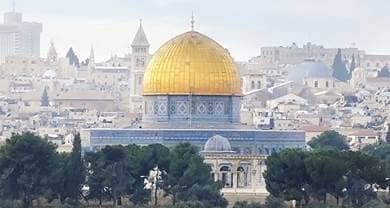
RELIGION LIBRARY
Islam
Founders
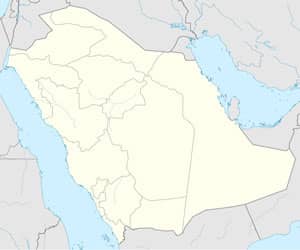 Muhammad is known as rasul Allah, or God's Messenger to the Arabs, and to all of humanity. He was born in Mecca ca. 570 C.E., and died in Medina in 632. Most of what we know about Muhammad comes from the Quran, but we also have biographies written in the century after his death (called the sirah) and the hadith. Some general histories contemporary with the sirah are also useful sources of information about Muhammad's life.
Muhammad is known as rasul Allah, or God's Messenger to the Arabs, and to all of humanity. He was born in Mecca ca. 570 C.E., and died in Medina in 632. Most of what we know about Muhammad comes from the Quran, but we also have biographies written in the century after his death (called the sirah) and the hadith. Some general histories contemporary with the sirah are also useful sources of information about Muhammad's life.
Muhammad's father died before he was born, and his mother died when he was six years old, leaving him an orphan. He went to live with his paternal grandfather, who sent him to live with a nomadic tribe. This was customary at the time for boys born in the towns of the Arabian peninsula. Later, Muhammad began accompanying his uncle, Abu Talib, on trading expeditions to Syria. On one of these trips, Muhammad met a wealthy widow named Khadija. Khadija was impressed by his honesty, and hired him to manage her caravan business. Eventually she proposed marriage. The couple was married for twenty-four years and had at least seven children together, four daughters who survived to adulthood, and at least three sons who died in infancy. The marriage was monogamous, and by all accounts was very happy.
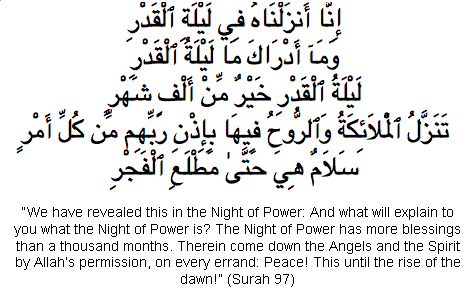
The night Muhammad was called to become a prophet of Allah, known as the Night of Power, took place when Muhammad was around forty years old. The strange and terrifying vision shook Muhammad deeply, but Khadija advised him to be steady and trust the vision. Muhammad began preaching to the people of Mecca in 613. His earliest messages focused on the oneness (tawhid) of Allah, the punishments that await the greedy and the proud on Judgment Day, and on exhorting people to show goodwill toward one another. He put special emphasis on the care of the poor, especially orphans and widows.
Muhammad gathered followers from a variety of segments of Meccan society, from both poor and weak clans, and wealthy ones. All seemed to be seeking something more fulfilling than the materialism offered by Meccan society. Muhammad and his followers critiqued the culture of competition and the high value placed on money and material goods, calling for submission to the will of the one true God. Mecca, however, was a center for trade and the most important destination in the peninsula for the annual pilgrimage that celebrated the pantheon of gods, a festival that netted for the Meccans their annual gross income. Therefore logically the merchant society of Mecca was not particularly receptive to Muhammad's critique of materialism and his calls for social reform and monotheism. The Meccans wanted Muhammad to stop preaching about monotheism and social justice. The most powerful tribal leaders in Mecca attempted to bribe him into silence by offering to share the wealth of the annual pilgrimage with him and even allowed for the God that Muhammad believed in to be deemed the most powerful of all the gods in Mecca. Muhammad did not cooperate with the Meccans' attempts at negotiations, and the Meccans began persecuting him and his followers.
In a town called Yathrib, north of Mecca, a civil war was tearing the town apart. Muhammad had established a reputation as both a charismatic holy man and a fair arbiter. So in 621 the city leaders sent a delegation to Muhammad to invite him to move to Yathrib. In 622, Muhammad and his followers left Mecca for Yathrib, an event remembered as the Hijra, or emigration. This event became year one of the Islamic calendar. Muhammad built the first mosque in his new home, and Yathrib became known as the city of the prophet, madinat al-nabi, or simply, Medina, one of Islam's three holiest cities (Mecca and Jerusalem being the other two).
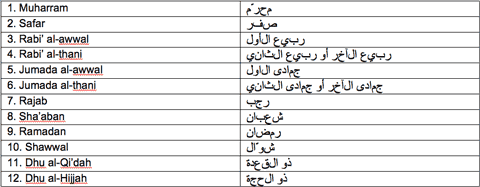
Once in Medina, Muhammad drafted an agreement on behalf of the feuding clans that guaranteed mutual respect and religious freedom, and required common defense of the city. Muhammad and his followers flourished, and added many more followers to their ranks. He was deeply disappointed, however, when leaders of the Jewish tribes of the city, close allies of Muhammad's enemies in Mecca, did not accept his claims to be a prophet, although they too signed the treaty to live together in mutual respect.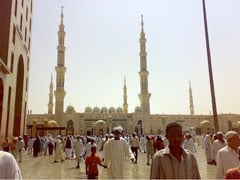 Until this time, Muhammad had taught that God's revelation to the Arabs was in a common stream with Jewish and Christian revelations, not a separate religion but the culmination of them. Upon this rejection from the powerful Jewish tribal leaders of Medina, Muhammad received revelation from God to break away and found Islam as a separate religion.
Until this time, Muhammad had taught that God's revelation to the Arabs was in a common stream with Jewish and Christian revelations, not a separate religion but the culmination of them. Upon this rejection from the powerful Jewish tribal leaders of Medina, Muhammad received revelation from God to break away and found Islam as a separate religion.
The Meccans continued to harass Muslims, confiscating and selling their property. They responded by defending themselves and their property. In 624, the Meccans and Muslims fought a major battle, with the Muslims defeating a Meccan force three times its size. Many saw this as a sign of God's protection, and converted to Islam. The following year, Muhammad and his troops suffered heavy losses in a second battle with the Meccans. Ultimately, however, Muhammad and the Muslims prevailed, and in 630, Muhammad and the Muslims took control of Mecca. Muhammad destroyed the idols in the Kaaba and the other shrines in the city, and performed the rites of pilgrimage.
Muhammad had married several women after Khadija's death, and he and his wives and children settled in Medina. The following year, many of the tribes of the peninsula pledged loyalty to Muhammad and Meccans converted to Islam. Muhammad had gained control of Arabia. After a pilgrimage to Mecca in 632, Muhammad fell ill and died in the home of his youngest and favorite wife, Aisha.
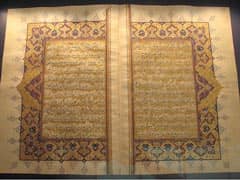 The Quran and the hadith emphasize Muhammad's humanity, portraying him, warts and all, as a mortal man with desires and limitations. In the Quran, God reminds Muhammad that he will face God on Judgment Day along with everyone else. Muhammad is a beloved figure in Islam, and Muslims remember him for his many virtues, such as fairness, gentleness, and kindness to everyone, especially the most vulnerable members of the community. He is recalled as wise and humble, never living above the rest of the community, his door open to anyone, quick to share his wit and charm. Muslims will often say "Peace Be upon Him," or write "pbuh," after hearing or saying his name.
The Quran and the hadith emphasize Muhammad's humanity, portraying him, warts and all, as a mortal man with desires and limitations. In the Quran, God reminds Muhammad that he will face God on Judgment Day along with everyone else. Muhammad is a beloved figure in Islam, and Muslims remember him for his many virtues, such as fairness, gentleness, and kindness to everyone, especially the most vulnerable members of the community. He is recalled as wise and humble, never living above the rest of the community, his door open to anyone, quick to share his wit and charm. Muslims will often say "Peace Be upon Him," or write "pbuh," after hearing or saying his name.
Study Questions:
1. Where does our knowledge of Muhammad come from? How is he portrayed in the Quran?
2. What was Muhammad’s family life like? How did his relationships help create the future of Islam?
3. What was Muhammad’s message, and why did the people of Mecca try to silence it?
4. Why was the Meccan/Muslim battle of 624 significant to the history of Islam?










